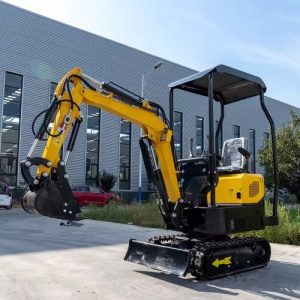
A mini excavator, also known as a compact excavator, is a small, versatile piece of construction equipment designed for earthmoving tasks in tight spaces. These machines typically have an operating weight of 10 metric tons (approximately 22,000 pounds) or less, making them ideal for residential and small-scale projects.
Key Characteristics:
- Size and Maneuverability: Mini excavators are compact, allowing them to navigate restricted areas, such as urban job sites or residential backyards, where larger excavators would struggle.
- Versatility: They can be equipped with various attachments, including buckets, thumbs, augers, and hydraulic hammers, enabling them to perform a wide range of tasks, from digging and trenching to lifting and material handling.
- Power and Efficiency: Despite their smaller size, mini excavators are powerful machines capable of handling many of the same tasks as their larger counterparts. They are often equipped with diesel engines that provide reliable power while maintaining fuel efficiency.
- Applications:
- Landscaping: Ideal for digging holes, planting trees, and moving soil.
- Construction: Useful for excavating foundations, trenching for utilities, and demolition tasks.
- Agricultural: Employed in farm work for various digging and lifting tasks.
- Types of Mini Excavators: Mini excavators come in various models and sizes, generally categorized by their weight class, from under 1,000 pounds to about 10,000 pounds.
Mini excavators are increasingly popular in the construction industry due to their versatility, efficiency, and ability to operate in confined spaces, making them an essential tool for many contractors and landscapers.
